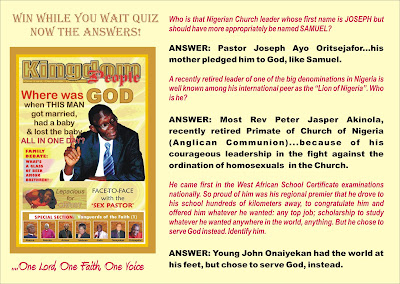 |
| Rev Yakubu Pam...North Central CAN |
For the benefit of those who might have missed the piece and therefore are probably at sea about all these, let’s rewind a little.
The Adamu Ciroma-led Northern Political Leaders Forum, in the process of searching for a consensus candidate to fight for the presidential ticket of the Peoples Democratic Party in the wake of the zoning controversy, decided to meet with leaders of the two major religious groups in the land. They did and while there has been no public reaction of any sort from leaders of Jamatul Nasrul Islam (JNI); the Northern wing of Christian Association of Nigeria (CAN), it would seem, has not been the same again, since then. A cleric by the name of Habu Aminci, reportedly claiming to represent the body told the British Broadcasting Corporation (BBC) Hausa Service that “the Christian community in the northern region has resolved to stand on the side of pro-zoning, by ensuring that Christians in the region vote on the side of a Northern aspirant, whether in the PDP’s presidential primaries and the general election as well..."
Reactions were swift. The Kaduna chapter of CAN was the first to speak through a statement signed by its secretary, Reverend John Hayab. The statement dissociated the group "from claims by a Christian clergy, Pastor Aminci that CAN has taken a position on Zoning and would only support a northern candidate in the 2011 presidential elections, saying it has no business with partisan politics".
Describing Aminci's claim as untrue, the statement said "CAN has never and will not, in any case, be partisan in issues related to politics rather, it will continue to maintain our neutrality of being apolitical but religious organisation conscious of national development, cohesion, integration and peaceful coexistence of our dear country."
CAN further stated that it “has no business with such partisanship politics, and has not in any way taken such a stand. Rather, its persistent stand that Nigeria as a country has suffered a monumental under development, owing to nothing but corrupt and bad leadership, and as such Nigerians must irrespective of religion, ethnicity, political inclinations rise and vote into power men and women of virtues, moral and upright tendencies..."
Next to react was CAN, North Central Zone. Rev Yakubu Pam who spoke on behalf of the zone denounced the Aminci's statement as unauthorised and not representing the views of CAN members in the area.
Then came the Christian Association of Nigeria (CAN) in the 19 northern states and the Federal Capital Territory (FCT), which spoke through its Secretary, Elder Saidu Dogo. His words:
“We wish to state that Pastor Aminci which some national dailies were quoting to have spoken on behalf of CAN in the north actually came with the Ciroma entourage and is not an official or the chairman of CAN in Bauchi State or any other state for that matter.
“The Chairman of CAN in Bauchi State is Bishop Musa Tula, who represented the northern CAN Chairman, Archbishop Peter Jatau during the meeting with the Ciroma committee. Pastor Aminci is not an official of CAN anywhere and therefore has no locus standi to speak for christians in the north.
“Those making any issue out of the interview he granted to the Hausa service of the British Broadcasting Corporation (BBC) were doing it mainly for mischief and for their selfish political interest. Our position as religious leaders is to remain neutral and continue to pray for the best leadership for this country.
“We wish to state in very clear terms that there is no crack in CAN and will resist any attempt to be dragged into issues that are purely the affairs of politicians. During our meeting with the Ciroma committee, we never said anything on zoning. What we told Ciroma and his committee members was that as religious leaders, we would continue to pray for the best leadership for this country...Ciroma restated our position at the meeting in an interview he granted journalists shortly after the meeting when he told them that the only thing one gets from religious leaders is prayers.”
That was the situation until Rev Aminci surfaced again on the BBC Hausa Service announcing the birth of what many see as a splinter group of CAN in the North and Abuja. Named Northern Christian Leaders‘ Eagle Eye Forum (NCLEEF), Aminci said his new group was a child of necessity borne out of his members’ determination to “not just watch a clique toy with the prestige and dignity of the North”. They are therefore poised to ensure the emergence of a Northerner as President in 2011 to that the North is not cheated out of the remaining four years of the Yar’Adua northern presidency.
He also countered those who said he was incompetent to talk on behalf of Northern CAN: “If they say I am not a member of CAN, they have made a mistake. I am a Christian and a member of CAN. That is indisputable.”
It is not hard to see that this man of God, if he indeed is one, is a political jobber who simply tried to use the platform of CAN to push the candidacy of his principal, whoever that is. When this was roundly and effectively resisted, he took the next obvious step: create a platform. In the circumstance, if the consensus candidate who has emerged is his principal, we we’ll hear a lot more about him and his so-called group in the coming days. If not, he’ll fizzle out unless the aspirant finds value in his mischief.
It is sad that we have people like him in our midst – giving us all a bad name. Lord have mercy.







